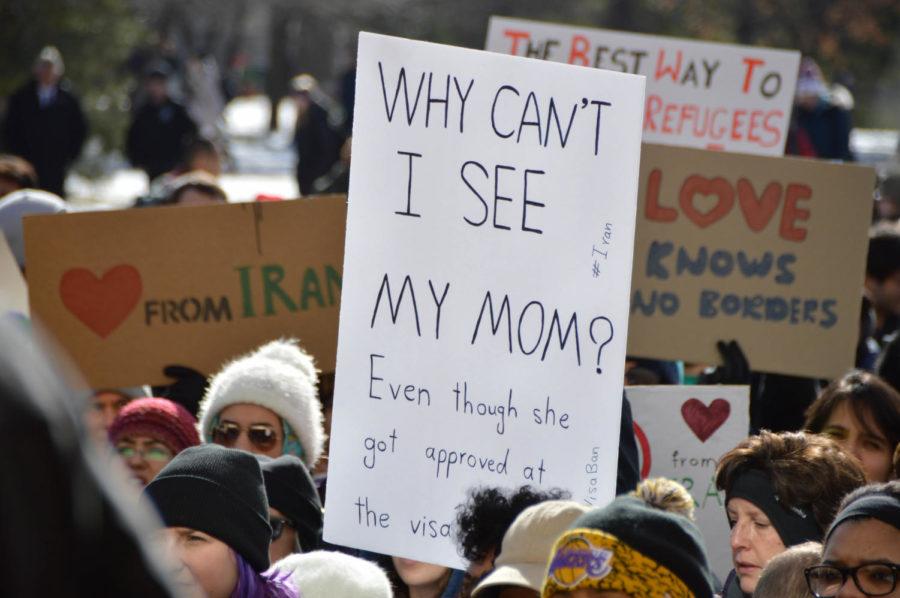‘This is not America:’ International students express threatened status in United States
Protesters gather around Parks Library with various signs during the Hoodies and Hijabs Solidarity March on Feb. 9.
February 9, 2017
Sinan Al-Rubaye feels like he’s been running his entire life.
Born in Iraq, the Iowa State pre-business student, fled his home with his family to Qatar, a country that would not have welcomed them if it wasn’t for his father’s business.
With no future in a nation that restricts jobs to only its natives, Al-Rubaye came to the United States to get an education. After finally feeling that his life was on track, President Donald Trump gave an executive order placing a travel ban on seven Middle Eastern countries.
Now, Al-Rubaye feels that he’ll be forced to move once again, only this time, he doesn’t have any place to run.
He is one of 115 students along with four faculty members at Iowa State affected by this ban.
“We’re now on a list because of things we didn’t choose. I didn’t choose my nationality, I was born there. It’s not my fault,” Al-Rubaye said. “I’m on the run, actually again because of something I didn’t choose.”
Al-Rubaye last saw his family in July and is unsure at this point when he will see them again. Because he is not native to Qatar, he will lose his residency if he doesn’t return by July.
If he loses his residency there, the Qatar’s strict border control laws will make it nearly impossible for him to ever return to see his family. The immigration ban would also keep him out of the Untied States if he decides to leave.
At this point, he’s not sure if he will be able to see his family until his graduation in 2020. When he finishes school, he’s not sure where the reunion would even take place.
Rahma Belaid, sophomore in aerospace engineering, sat to the left of Al-Rubaye. They are from two completely different countries, have different backgrounds and despite both being affected by this executive order, Belaid has her own separate struggles.
Belaid came from her home country, Libya, to start school in the United States in 2014. After spending two years away from her family, she planned to visit home to be by the side of her younger sister, who will be receiving a difficult and dangerous surgery.
Her brother broke the news of the immigration ban to her while she was in the middle of an online test.
At first, she believed it to be a joke, but when she went on Facebook, she saw for herself post after post relating to the matter.
“People would say that ‘[Trump] wouldn’t dare do this. Don’t take him seriously,’ but it was just one week and he did all this damage,” Balaid said.
Belaid’s sister had asked her to be at the surgery. Belaid said her sister is young and scared, but going home would mean giving up her degree. Ultimately she had to make the decision to stay at school.
Belaid and Al-Rubaye both drew conclusions between America’s current administration with what they saw in leadership in their home countries, calling it “the Middle East way.”
“We are familiar with this because the Middle East is like this,”Al-Rubaye said. “A new president that comes in, he changes everything in the country the way he wants. No one can even dare talk to him. America is turning into a Middle Eastern country.”
Al-Rubaye recalls hearing stories of America back home. He thought of it as the “country of freedom” and the “country of love.” Now, in his eyes, it is turning into the country that he left behind.
After coming from a war-torn country that faced years of conflict with America, Al-Rubaye attributes the amount of refugees to the United States.
“You don’t want refugees to stop destroying our countries,” Al-Rubaye said. “You can’t expect no refugees while you are occupying our countries.”
He recalls life in Iraq before war, saying Baghdad was one of the most beautiful cities in the world. A quick Google search brings up pictures of libraries and buildings once prosperous now in rubble.
He explained that he wasn’t saying that his home country didn’t have the best situation, but added, “look at us now.”
The concept of protecting real Americans confuses Al-Rubaye because his understanding was that this is a country built by immigrants.
Al-Rubaye cited Steve Jobs, the son of a Syrian immigrant, saying that he changed the world when he co-founded Apple.
As these students worry about their status in the United States, they still feel the pressure of school work that every other student at a university has looming over their heads.
Al-Rubaye finds it hard to motivate himself to focus on his studies when his education could be cut short.
He also worries about his father, who pays for his education. If he doesn’t leave this institution with a degree, the money that went toward tuition will be wasted.
As for Belaid, a contributor to her tuition was a grant from her government. This grant gave her the opportunity to study anywhere in the world. Belaid chose to come to America.
Al-Rubaye has two siblings going to school in Canada telling him to transfer there. He tells them no. He went to school in the United States because this is where he wants to be.
Belaid also cited her reasons for attending school in the United States.
“I chose America because I know that I’ll be myself, I’ll have my freedom to practice anything I want, to meet people from all around the world,” Belaid said.
She added that now he is planning to ban people based on of their religion and nationality. She believes it is unacceptable, saying that “this is not America.”







